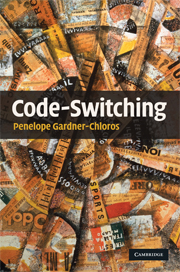Book contents
- Frontmatter
- Contents
- Acknowledgements
- Transcription conventions
- 1 Introduction
- 2 Code-switching and language contact
- 3 Social factors in code-switching
- 4 Code-switching in conversation
- 5 Grammatical aspects of code-switching
- 6 Psycholinguistic approaches
- 7 Acquiring code-switching: code-switching in children (and L2 learners)
- 8 Conclusions
- Appendix
- Bibliography
- Index
Appendix
Published online by Cambridge University Press: 10 February 2010
- Frontmatter
- Contents
- Acknowledgements
- Transcription conventions
- 1 Introduction
- 2 Code-switching and language contact
- 3 Social factors in code-switching
- 4 Code-switching in conversation
- 5 Grammatical aspects of code-switching
- 6 Psycholinguistic approaches
- 7 Acquiring code-switching: code-switching in children (and L2 learners)
- 8 Conclusions
- Appendix
- Bibliography
- Index
Summary
Introduction
Over the last few decades, data on bilingual and multilingual talk has been collected through projects, large and small, in many countries and involving many different languages and dialects. It has become a source of frustration for many who work in this area that there is no basic standard for transcribing data of this kind, nor any central resource to enable researchers to share their data with each other. Meanwhile, researchers in some fields have begun to take advantage of new technological developments to enable data to be shared. Researchers in language acquisition, for example, have both standard ways of transcribing and coding data, and international databases to which they can contribute and on which they can draw for comparative data.
The purpose of the LIPPS initiative is to provide support and propose a system for transcribing and coding bilingual data that takes into account research questions specifically related to multilingual communities and individuals. Researchers in the field may benefit from the LIPPS initiative in two ways:
(1) By following the step-by-step guidelines to carry out the transcription and coding which make it possible to use already existing computer-based analytical tools.
(2) The existence of a set of basic standards for transcribing and coding bilingual data should encourage research on language interaction from an interdisciplinary perspective. Thus, a special effort is made to cater for the needs of researchers working in very different disciplines within the field. The proposals made here are equally intended to help those who are interested in quantitative and qualitative research. Useful guidelines are provided so that solutions may be found for problems that may arise in the processes of transcription and coding. In addition, some user-friendly computational tools are discussed which provide support in exploring and analysing language interaction data.
- Type
- Chapter
- Information
- Code-switching , pp. 181 - 204Publisher: Cambridge University PressPrint publication year: 2009



